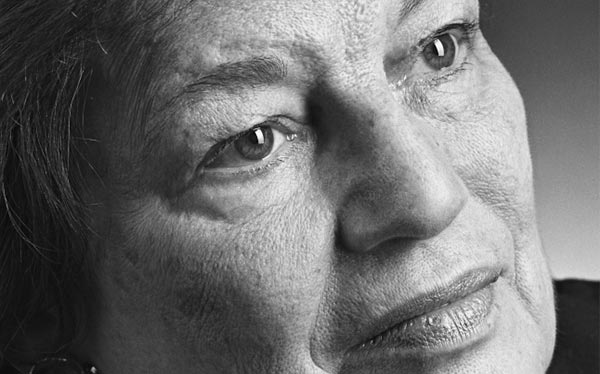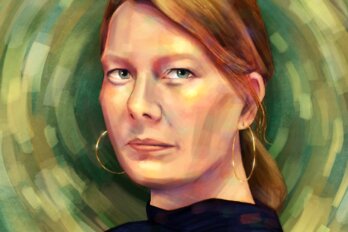“M’excuser, monsieur. Je cherche des livres par Mavis Gallant. Où peux-je les trouver?” I asked the bookseller my question and then braced for his answer. This was an upmarket bookstore in Montparnasse, after all, and I was fumbling at the counter with Ontario schoolboy French. If my prior encounters in Paris were a reliable guide, my effort would be met with a practised combination of annoyance, pity, amusement, and withering contempt. But this time proved different. The bookseller ignored how rudely I had chewed through his native tongue.
“Pardon. Je sais que nous devons avoir ses livres, mais nous ne les avons pas,” he said in a sheepish, apologetic way, as if he were acknowledging a failure of literary responsibility. He knew he ought to have Mavis Gallant’s books on offer, but he didn’t. I would expect an exchange like this in a Canadian bookstore, but it was surprising here, in Paris, in Gallant’s own neighbourhood, in a city she’s been living in for some five decades. I was about to meet her at a restaurant across the street and had ducked into the bookstore, curious to see where, not if, Gallant was placed on the shelves. She had chosen the restaurant and agreed to a conversation on a Sunday afternoon this past October through a correspondence that had stretched over a year. Though eighty-four, frail by her own admission, and exhausted from participating in two recently filmed documentaries about her life and work, she eventually agreed to my request.
The Parisian bookseller’s response was a familiar one. People don’t read Mavis Gallant so much as know they ought to. In preparing for the interview, I canvassed well-read friends, academic colleagues, editors, and fellow writers about their responses to her work. Her name elicited high regard in both Canadian and American settings. But across the board, there was comparatively little in the way of particulars. “I love ‘The Ice Wagon Going Down the Street.’ It was in an anthology. I really should read more of her stuff.” “I enjoy her stories. They used to come in the New Yorker all the time, years ago. But I never knew what to make of them by the end.” “Gallant? Oh yes, she’s one of those writer’s writers…”
The last of these responses is perhaps the most telling in terms of Gallant’s standing in the contemporary literary world. At a November 2006 event held in her honour in New York, Russell Banks, Michael Ondaatje, and Jhumpa Lahiri lined up to offer high-minded appreciations. Their speeches were uniformly glowing, but gave off a proprietary admiration—fellow members of the guild paying respects to one of their betters. A writer’s writer—the phrase implies that only someone intimate with the art can discern the full extent of the brilliance at play. With a readership perhaps better understood in terms of quality rather than quantity, one wonders if the effect of Gallant winning so much esoteric praise has been, in part, to close her writing off from a wider readership.
In the Canadian context, at first glance it’s not the difficulty of reading Gallant so much as the difficulty of locating her that has denied her a native audience commensurate with her international standing. In fact, we’ve devised a deviously effective storyline to make sense of this writer, a storyline that gives Gallant her due and also gives us a reason to avoid reading her.
Born in Montreal in 1922, Gallant had a peripatetic childhood, marked by time in both Canada and the United States. As a young woman, she gave up a career in journalism with the Montreal Standard and moved to Europe in 1950, submitting three short stories to the New Yorker with the idea that if she were to find success with this first set of submissions, she’d commit to writing for good. She met with immediate success, and through her recurrent appearances in the New Yorker and from the short story collections that were thereby assembled, Gallant developed an impressive position in international circles. She was, however, little known or read in her native Canada before the late 1970s, when Macmillan of Canada and then McClelland and Stewart started publishing her work. She won a Governor General’s Award in 1981, and thereafter received a series of awards and honorary doctorates. Her early story collections were reissued with admiring introductions and afterwords by Ondaatje, Banks, and Mordecai Richler.
And yet, Gallant has never enjoyed a standing in Canada comparable with the writer who shares her native origins, chosen genre, and international renown—Alice Munro. The reason is ostensibly geographic: Munro’s life and work represent an emphatic and sympathetic commitment to verifiably Canadian concerns and settings, whereas Gallant comes across, in personality and sensibility, as detached. As such, she can only command so much attention from a literary culture obsessed with national textures, which often frame the reading of native writers as a good citizen’s patriotic duty.
Leaving aside the politics of who and why Canada reads, Gallant can be a very difficult writer to encounter. There are demanding moments in Munro’s fiction, to be sure, but these are mostly borne of the intensities of emotion and epiphanic insights that come of her genius for detailing the complex inner lives of ordinary people. Ultimately, though, Munro’s are comforting fictions: the governing sensibility of her short stories is wise, melancholic, and compassionate. Gallant, on the other hand, forces us to confront sterility, displacement, and alienation in her stories, often without a final resolution of the human difficulties therein revealed. She brings a cold voice and a hard eye to bear on the world, and has created a body of work that reads as a basic rejection of the Canadian literary commitment to imagining the humble virtues and humbling vices of modest local lives.
There was also a joint past that lay all around us in heaps of charred stone. The streets still smelled of terror and ashes, particularly after rain. Every stone held down a ghost or a frozen life, or a dreadful secret.—“An Alien Flower” (1972)
During our conversation, at a grand old restaurant where Paris families were stretching their languorous Sunday brunches into afternoon coffees, it was clear that Gallant had little interest in addressing her relationship to Canada and Canadian writing. She treated my questions on this subject like houseflies and was palpably interested in moving on to other things. There was only one moment where she warmed to the theme. She recalled a 2002 trip to Montreal—“her native city” as she said with fondness. But this was a trip made in ambivalence because her physical mobility was limited; she went with the knowledge that she’d “never see the city again.” Gallant didn’t linger in the elegiac for very long when discussing her time in Montreal, or on any other matter. That’s because her personal feelings and geographies aren’t nearly as important to her as her vocation. Asked about how she’d like to be read and remembered, she answered, “Gallant, writer.” We could describe her with any number of adjectives—the Paris-based-expatriate-Quebecer-anglophone-Canadian-Protestant-female-short-story-writer Mavis Gallant. But doing so ignores Gallant’s primary ambition, and the degree to which she has achieved it, in becoming simply, formidably, a writer.
In a preface to her 1996 collected works, currently out of print in North America, Gallant describes literature’s purpose as evoking “a climate of the mind.” Like much (and there’s not much) of what Gallant has said when asked to comment on what she does, the description is terse and opaque. But then, her stories speak for themselves, doing exactly what they’re supposed to without need of authorial clarifications and embellishments. Consider, for instance, this passage from “Between Zero and One” (1975), one of Gallant’s Linnet Muir series of stories on a young woman’s time in a bygone Montreal:
I remember a day of dark spring snowstorms, ourselves reflected on the black windows, the pools of warm light here and there, the green-shaded lamps, thedramatic hiss and gurgle of the radiators that always sounded like the background to some emotional outburst, the sudden slackening at the end of the afternoon when every molecule of oxygen in the room had turned into poison.
The intensity and beauty of this passage come not just from its choice and expression of detail, but from the evenness of tone Gallant achieves while building to its startling last word, which gathers unto itself the unsettling implications of the preceding parts of the sentence. This evokes an office setting in World War II-era Montreal, or, more precisely, a climate of the mind borne of the smallish, bitter lives that come together and break apart in that office over the course of the story.
Measuring the passage’s veracity by the historical record, or determining how much of the narrator’s experiences are variations on the author’s time in Montreal as a journalist with the Standard in the 1940s, is much like uncovering which Mississippi streets and Civil War sites Faulkner knew firsthand. The result may be a frisson of local pride, but this is a distraction when approaching a great writer. The prospect of such a reading experience is made all the more enticing in Gallant’s case because of her chosen form: the short story. In her handling, the short story works up intensely concentrated encounters between people, around which move whole constellations of discreet meanings. To engage such art requires a commitment of intellect and imagination capable of meeting and withstanding Gallant’s vision of the world: a sometimes fatalistic, sometimes sympathetic regard for the all-too-human longings and occasionally funny cruelties that people visit upon each other. And this is a regard that proceeds from an unflinching commitment to revelation for its own sake.
Gallant takes offence at efforts by others to undermine that commitment by attaching it to secondary interests. She once dismissed academic commentaries, in a piece reprinted in Paris Notebooks, her collected non-fiction, as “the fleas of literature.” Reminded of this dismissal, she was immediately amused. “Did I?” she said with a smile, her eyebrows turned up. “Well I believe it, because I’m apt to say things are ‘the fleas of.’” The self-effacement quickly gave way to stronger feelings. “I’ll tell you what my thing is with academics,” she continued in a harder tone. “They take something that is complete, say a story, that is not material to work with—it’s complete; it is to the writer anyway—and they take it as crude ore that they’re taking out of the ground, to suit some purpose of their own, and I find this outrageous.”
We’d met in front of La Coupole, a Montparnasse institution that, in earlier days, “was as dim as a night train and served terrible food,” where “out-of-town diners used to search for a glimpse of Sartre or Beckett and try to make out if the forks were clean.” The description comes from one of Gallant’s Henri Grippes stories, which concern a congenitally unlikable, comedic character whom the author gleefully described, in an aside, as “absolutely awful.” La Coupole has changed; it’s a clean, well-lighted place now, its bohemian history homogenized by guidebooks into a literary tourist’s stop. Gallant was grateful for assistance out of her taxi; candid about the inevitable weakening of her constitution, she was nevertheless lively and canny throughout our conversation, ignoring respectful queries about whether it was getting late and dismissing the tape recorder when the cassettes stopped.
Helping an elegantly dressed old woman out of her cab soon gave way to working hard to keep up with the pace and range of her conversation. We sat and talked for some two hours, and Gallant would often answer a straightforward question with a narrative that moved across personal, historical, and geographic terrains. Asked, for instance, to distinguish between Catholic culture in Quebec and France, she replied, “It depends which period you’re talking about. If it’s now, in Quebec, it barely exists, it’s much more liberal. But then?…” She trailed away for a moment, then explained her point via story and image. “I lived two years in Spain, under Franco, and there were things allowed in a couple of bookstores that wouldn’t have been allowed in Quebec. There was Trotsky’s History of the Russian Revolution, in two volumes in English, which you could find there.”
This digression held much in the way of answering my question, but mention of her time in Spain sent her into another recollection. “I remember being twice in a bus in Madrid and seeing, one, a Scotsman in a kilt, walking along a street looking in windows, and followed by boys who thought this was hilarious.” Again she paused for a moment, but then offered her second strange sighting on a bus in Madrid. “The other was a woman in slacks, in 1952.” Here she leaned in a little, to underscore the comparative absurdity of this finding. “The people in the bus got up and came over to my side and were talking about the mujer in pantalones. Well, in Quebec, if it had been a mujer in shorts, there would have been a cop called, right away. But that’s so long ago.”
Gallant enjoyed clarifying her point about religion in France, where the Church “is smaller now” and the second religion is Islam. “It’s Catholic, Muslim, Jewish,” she said, then broke into a high-pitched voice while making a falling gesture with her hands, “and way down there, a few Protestants, poor little things, an endangered species.” While the Church may be in decline in France, its presence is inherently part of the life of the nation: “But it’s a culture,” Gallant explained, “that’s it.” She made several points in this concise, emphatic way. There was much matter behind any one instance, but there’s no time for clarification; she assumes you’re with her and moves on.
“One of the things I’ve always noticed in France: that they use Christian and Catholic to mean the same thing. I remember a woman once saying to me, ‘Although I am a Christian, I have nothing against Jews or Protestants.’” The genial satire on display here gave way to a sharper sort of humour on other topics. She was (correctly, it turns out) dubious about the odds of Ségolène Royal becoming France’s first woman president, because while “women have rights in France, still the men have an attitude”—one that she demonstrated, wordlessly, by pulling her face into a Gaullic male grimace at the notion of a woman assuming the country’s highest office. As for the 1968 Generation, now the establishment in France, she was particularly lethal in her assessment of the Socialists: “These are people who have ideas but have never had to wait for a bus.” She was equally efficient with writers whom she holds in low regard. “He’s basically bourgeois,” she said, dismissing the controversial Michel Houellebecq.
When queried about her feelings toward the New Yorker, she was initially even shorter. “I pass,” she said coolly. But then she opened up to the question about the magazine where her writing has appeared almost exclusively for her entire career. “When I placed my first story, it was still Harold Ross, the founder. I never met him, he died a year later. And then came [William] Shawn, and then came [Robert] Gottlieb, then came…Lady Godiva, who came and went.” She laughed, enjoying this particular description of the controversial editorship of Tina Brown. She spoke well of the current editor, David Remnick: “A very good journalist. The magazine shows that, it’s journalism with a slot for fiction.”
Describing the latest formulation of the New Yorker this way brought Gallant nearer to an understandable lament. The magazine used to feature two stories per issue, she explained. She said this wistfully, but my attempt at a sympathetic response put a stop to that. Her voice cooled once more and then became emphatic. “There’s no point—when it’s changed, it’s changed. And apart from deploring it, you think, ‘Well maybe I’m immune to change,’ and I don’t want to become that way, but after all I’m eighty-four. I have to keep that in mind.” She served notice that she’s “not like that about other things,” then abandoned the whole matter. “I think I should just shut up.”
Don’t forget me, Grippes silently prayed, standing at the periodicals table in La Hune, the Left Bank bookstore, looking for his own name in those quarterlies no one ever took home. Don’t praise me. Praise is weak stuff. Praise me after I’m dead.—“Grippes and Poche” (1982)
Harsh here, as she was elsewhere on other matters, Gallant was liveliest when she interrupted herself with an excited “Oh!” in the midst of answering a formal question. In one instance, when discussing the status of Arab intellectuals within the ranks of Paris’s chattering classes, she recalled a story that she much preferred to tell. She described a Christmastime ride taken with a Muslim cab driver, when returning home after a late evening with friends. After Gallant passed on to the driver a gift of chocolates she’d received, the two struck up an animated conversation on an array of subjects, ranging from diabetes, marriage, and children, to prayer schedules, divine inspiration, and writing. While she told the story, I found myself presuming each turn had reached the insight of the story, only to follow her to another turn, and another, and still another. The telling ended not with a sage statement on religion, or on Paris’s new immigrants, or pluralism in action, but on a light and devious note, with Gallant tricking the cabbie into letting her pay the fare after he insisted that their conversation was payment enough.
It was inevitable, while Gallant sat across from me and told that tale and others, that I would try to discern in them some form of symmetry with her stories, but I also knew that this was a fool’s game. Gallant’s fictions are intricate and precise creations. As she said, “I will rewrite a whole page for a sentence.” But listening to her recount her exchange with a cab driver, as when I was listening to her story of the kilted Scotsman in Madrid, put me in mind of a defining feature of her short stories, one that makes them such a draw on the reader’s imagination and intellect: their ability to work up a compelling situation and dwell patiently and economically in its intersecting complications, gradually coming to a culminating moment that’s postponed and shifts, however many times, before the story ends with a deft deflection of our expectations.
“In the Tunnel” (1971) moves along these lines. It’s the story of a young woman, Sarah, who pursues an ill-starred summer fling with an older man to prove she’s not the headstrong danger to herself that her father thinks she is. And so it goes: “In love, she had to show her own face, and speak in a true voice, and she was visible from all directions.” Sarah’s story is excruciating because of the many assumed turns toward less hopeless conclusions that pass by, but also because the story manages to be at once cruel, funny, and sympathetic.
This is the difficult pleasure of reading Gallant. Whereas the best of Munro builds to reconfirmation of humanity in its daily struggling, Gallant at her best is elliptical and recalcitrant. The endings of her strongest stories feature a distancing from the prior intimacy that has developed between reader and character. “Some summer or another would always be walking on her grave” is a strangely worded, estranging close to “In the Tunnel,” resolving very little for us; the core meaning remains within the character herself. Here, and at the end of many other of her stories—“When We Were Nearly Young” (1960), “The Pegnitz Junction” (1973), “The Four Seasons” (1975), and “Scarves, Beads, Sandals” (1995) come to mind—Gallant invests her characters with the dignity of independence, in thought and emotion, to keep doing as they see fit, however blinkered they may be. Gallant’s opaque endings free her characters from the tainting designs of anyone positioned outside the world of the story, whether author, reader, reviewer, or foot-noting academic flea. At the end of the very best of her stories, I leave with the impression that I’ve been taken as close to the truth of a human life as I can be by a work of literature. But equally, Gallant reveals the greater depths of that truth, which she refuses to collapse into more easily exposed meanings that harmonize with impressive theories and cultural patriotisms, meanings that can be contained within the soothing symmetries, ironies, and reversals that we look for in stories.
The coffees had cooled, and the tables in La Coupole were emptying, the waiters mostly standing around, waiting for the evening to start. And I had yet to ask Gallant about her formation as a writer. I had a feeling that she’d treat the questions like those housefly queries about Canada—inevitable, annoying, unwanted. When I did raise the matter, she invoked the Russians, particularly Chekhov, and also cited Hemingway. “He’s taught us all how to write dialogue.” As would be expected, she prefers his short stories to his novels: “I read some so often, I almost knew them by heart, like music.” And when we turned, finally, to the matter of her writing, Gallant drew on Hemingway again. Her responses were uniformly terse. “I rewrite a lot, but I don’t change much.” “It’s mostly pruning you know.” “Everything starts off too long.”
Perhaps growing anxious at the thought of discussing her work, she offered a casual but conclusive self-reproach, “I’m a traitor to my own cause,” which brought the conversation to its close. Of the few answers Gallant did give about her writing, the most revealing had to do with how she balanced the relationship between depth and concision, so crucial to the short story form. I asked her how she knew when to take and when to give back.
“It comes on its own.”
There’s word of Gallant publishing the journals she’s kept for years. Biographies and critical studies of all sorts will inevitably be written, but one should be skeptical of how far into, or beyond, these five words such material will go toward making sense of why and how Gallant has accomplished as much as she has. Writers of the highest order cannot explain themselves or be explained to a standard matching their greatness, because in a very real way there’s nothing to explain, including why they left one place to live in another or what they make of the place they left. Their work, if successfully brought off, is a testament unto itself. Everything else, Gallant’s example suggests, should be silence; otherwise the work is overshadowed by the obvious and the incidental. Our discomfort before such reticence may be a sign of our insecurity before a writer whose greatness stands independent of a national culture, a minority position, or a regional tradition. This is someone confident enough of her craft to be known, simply, as Gallant, writer.
After the bill was settled, with a doubly amused Gallant negotiating between a fumbling young waiter and me with my credit card and my poor French, I walked her to a cab stand. We strolled up Montparnasse to a busy corner just coming under its first shadows. She considered an invitation to dinner while waiting for a car to come up. She declined and left.





